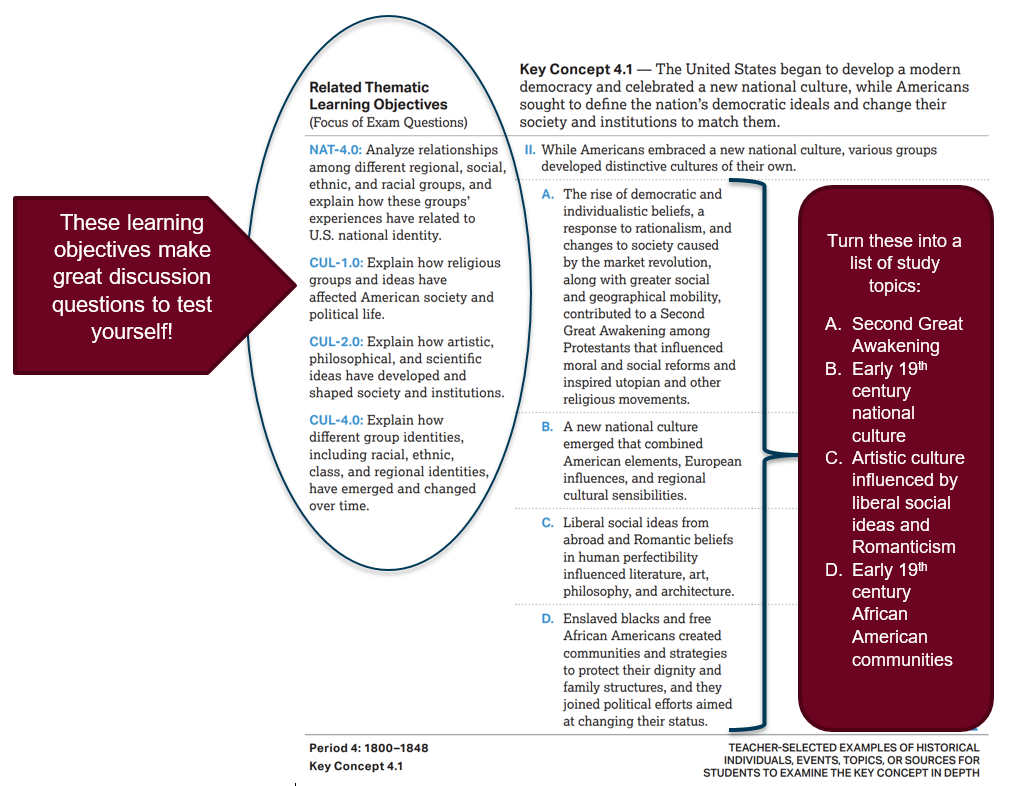AP exams are among the most challenging standardized tests high school students will face. These marathon tests usually cover an entire year’s worth of information. The sheer volume of knowledge required means that students should prepare for these exams carefully and thoroughly.
What do I need to think about when planning for AP exam prep?
The two biggest considerations when starting AP exam prep are how much content you need to cover and how much time you have to prepare.
How much content?
Think about how many subjects you need to study—are you taking one AP exam? Two? Ten? This will have a big impact on how much material you need to cover.
Within each AP subject area, create a list of topics you know will be on the test. How do you know what’s on the test? Hopefully, your AP teacher will have given you a pretty thorough overview of the AP exam, but if not—or if you need a refresher—check out the course descriptions on the College Board website.
Here’s an example from the AP US History Course Description:

Next, think about how confident you are in each topic—on a scale of “I got this” to “uh oh,” how confident are you in your understanding of the course material thus far? If you know you know your stuff, AP exam prep will be much easier than if you’re pretty sure you’ve already forgotten everything you learned in the fall.
Check out our Ultimate AP Exam Study Planner for a tool to organize and prioritize your study topics.
How much time?
Pull out a calendar and count the weeks between now and AP exams. This is your finite AP exam prep window—unlike most other tests, you can’t just push these exams back a month or two if you’re not ready yet.
Now think about your after school schedule from week to week. Once you account for your regular homework load, your extracurricular activities, other responsibilities, and sleep, how much time do you have left over each week to dedicate to AP exam prep? Be realistic. If you plan to spend 8 hours a week studying for AP exams when you can really only dedicate 4 hours a week to AP exam prep, you’re planning to fail.
When should I start prepping for AP exams?
In a way, AP exam prep starts on the first day of class: the best AP exam prep is working diligently to learn the material throughout the school year. Formal, intensive AP exam prep—the kind with study guides and practice tests—should start a good 8 to 12 weeks before your AP exams (for the mathematically challenged, that’s February or March). This allows you to review the material in smaller chunks over time rather than trying to cram a ton of information into your head at the last possible minute.
How should I study for AP exams?
The best AP exam prep approach differs from student to student and subject to subject. For example, you probably won’t study for AP Literature the same way you would study for AP Calculus because the subjects and exam formats are so different.
With that said, there are certain principles that apply no matter what you’re studying for.
Planning for Success
 You’re busy—we get it. Taking the time to make a study plan can seem like a waste of valuable time, time that you could spend actually studying.
You’re busy—we get it. Taking the time to make a study plan can seem like a waste of valuable time, time that you could spend actually studying.
But what if there was actual scientific proof that making a study plan boosts your performance?
Researchers from Stanford, University of Texas at Austin, and University of Michigan Ann Arbor conducted a study in which they split students in an introductory statistics class into two groups. Prior to their exams, both groups were asked about their goals and motivation for the upcoming test. Students in the treatment group were then asked to think about the types of questions that would be on the exam, to identify resources they would use to prepare for the exam, and to identify where, when, and how they would implement each resource. In other words, they were asked to create study plans.
On average, the students who created study plans scored 9% higher on their exams than the students who were not asked to create study plans.
9% can easily make the difference between a 4 and a 5 on your AP exams.
The Science of Learning
Whether you’re studying for AP psych or not, psychology researchers have some tips to help you ace your AP exams.
- Test yourself. The science-y term for this is “retrieval practice.” The more often you retrieve information, the easier it becomes to recall in the future. Quiz yourself with flashcards or take practice AP exams (the College Board has a nice collection of previously released exams online).
- Space out your reviews. Don’t review the same concept in back to back study sessions. By spacing out your reviews (“spaced repetition”), you create what’s known as a “desirable difficulty.” Think of it like a workout: For a workout to be effective, you have to challenge yourself. The studying equivalent is to give yourself enough time to “encode” the information in your memory before you force yourself to recall it again.
- Build a strong web around the information. The more connections you can create in your mind, the more likely you are to remember new information. Connect new pieces of information through elaboration (explaining/describing information using a lot of details), dual coding (combining words with visuals like mind maps or images), and concrete examples (using specific examples to better understand abstract ideas).
More AP Exam Study Tips
But wait! There’s more. Here are a few of our top study tasks to help you remember new information:
- Create your own study resources. The act of writing information down helps you to learn it. Don’t use pre-made flashcards—make your own. Don’t borrow someone else’s course notes—rewrite and reorganize your own notes.
- Teach it. One of the best ways to cement knowledge in your mind is to teach it to someone else. This forces you to engage the material in a new and unique way, helping you to better understand the nuances of the information. Teach it to your parents, a study buddy, a tutor, or your cat.
- Change it up. Studying one idea for too long eventually gives you diminishing returns. Change topics often to keep your mind sharp, and remember to take plenty of breaks!
Don’t forget to also check out our post with our Top 5 AP Prep Tips.
Get AP Prep Help

There’s no shame in seeking out additional support in your test prep efforts. In fact, AP prep programs like the ones C2 offers help students stay accountable to their study plans and make them more effective learners. You can read more about the value of test prep programs here.









